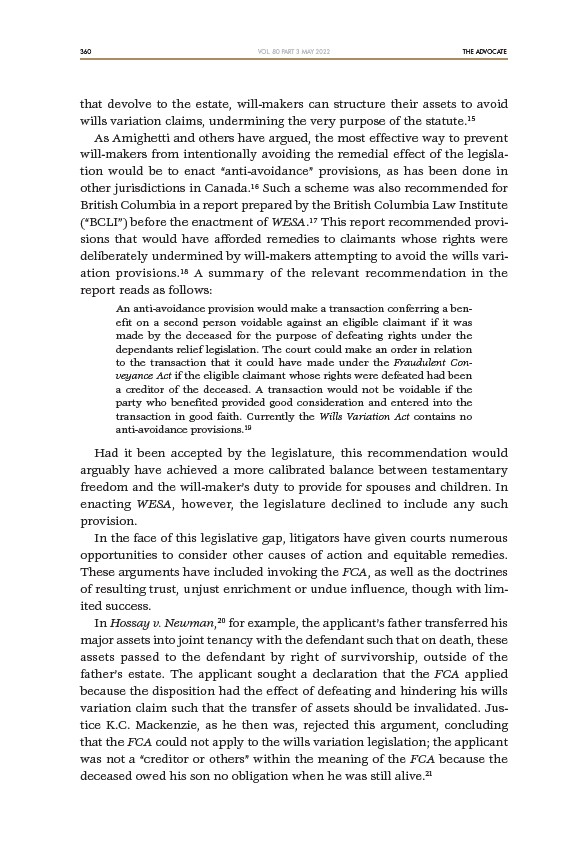
360 THE ADVOCATE
VOL. 80 PART 3 MAY 2022
that devolve to the estate, will-makers can structure their assets to avoid
wills variation claims, undermining the very purpose of the statute.15
As Amighetti and others have argued, the most effective way to prevent
will-makers from intentionally avoiding the remedial effect of the legislation
would be to enact “anti-avoidance” provisions, as has been done in
other jurisdictions in Canada.16 Such a scheme was also recommended for
British Columbia in a report prepared by the British Columbia Law Institute
(“BCLI”) before the enactment of WESA.17 This report recommended provisions
that would have afforded remedies to claimants whose rights were
deliberately undermined by will-makers attempting to avoid the wills variation
provisions.18 A summary of the relevant recommendation in the
report reads as follows:
An anti-avoidance provision would make a transaction conferring a benefit
on a second person voidable against an eligible claimant if it was
made by the deceased for the purpose of defeating rights under the
dependants relief legislation. The court could make an order in relation
to the transaction that it could have made under the Fraudulent Conveyance
Act if the eligible claimant whose rights were defeated had been
a creditor of the deceased. A transaction would not be voidable if the
party who benefited provided good consideration and entered into the
transaction in good faith. Currently the Wills Variation Act contains no
anti-avoidance provisions.19
Had it been accepted by the legislature, this recommendation would
arguably have achieved a more calibrated balance between testamentary
freedom and the will-maker’s duty to provide for spouses and children. In
enacting WESA, however, the legislature declined to include any such
provision.
In the face of this legislative gap, litigators have given courts numerous
opportunities to consider other causes of action and equitable remedies.
These arguments have included invoking the FCA, as well as the doctrines
of resulting trust, unjust enrichment or undue influence, though with limited
success.
In Hossay v. Newman,20 for example, the applicant’s father transferred his
major assets into joint tenancy with the defendant such that on death, these
assets passed to the defendant by right of survivorship, outside of the
father’s estate. The applicant sought a declaration that the FCA applied
because the disposition had the effect of defeating and hindering his wills
variation claim such that the transfer of assets should be invalidated. Justice
K.C. Mackenzie, as he then was, rejected this argument, concluding
that the FCA could not apply to the wills variation legislation; the applicant
was not a “creditor or others” within the meaning of the FCA because the
deceased owed his son no obligation when he was still alive.21